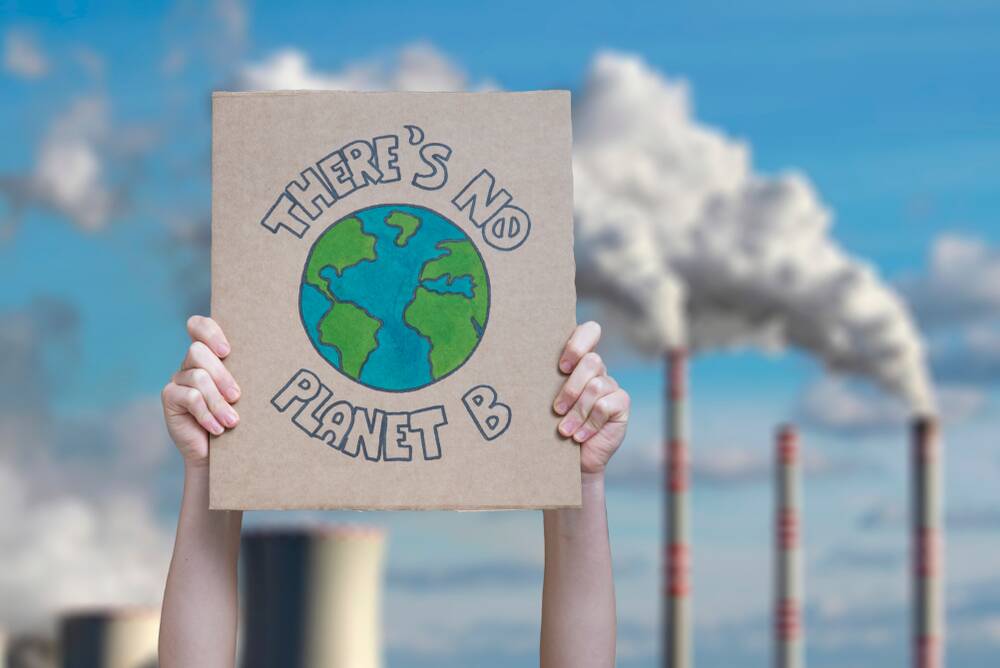The global mental health toll of climate change: What can be done?

This is branded content.
The physical toll of climate change is very evident.
Extreme temperatures lead to heat stroke, floods spread disease, and fires lead to respiratory and heart illness.
The mental toll, however, is often not as visible. Behind the victims of heat stroke are families grieving.
Behind the disease spread by floods are destroyed homes and businesses, the state of which severely affects the livelihood of many individuals. The same can be said for the people suffering from displacement and respiratory problems due to major fires.
In fact, survivors of these natural disasters can often experience deep, all-encompassing trauma because of it.
It's little wonder that a major report called The Lancet Countdown on Health and Climate Change has detailed research from more than 120 different sources which show that climate change is resulting in profound, immediate, and worsening mental health.
For an already stretched mental healthcare system, any event that generates a significantly higher influx of patients must be reviewed to ensure the proper support systems are in place for both the healthcare professional and those who are mentally impacted.
Those already working in the healthcare sector and those currently studying for degrees or an online clinical counseling masters to become doctors or mental health professionals need to have the proper resources and systems in place to provide support to those who experience these terrible situations.
How does climate change affect mental health?
Climate change can affect the mental health of individuals in two significant ways; either as a direct result of being impacted by a climate change event, or via climate anxiety, also known as 'eco-anxiety'.
Directly impacted
Climate change is leading to more frequent occurrences of extreme weather events, and people who are exposed to this have the potential to experience traumatic experiences including witnessing serious injury or death.
As a result of this, many people are more likely to experience higher levels of psychological distress.
Extreme weather events can also impact an individual's economic livelihood, living circumstances, and access to food and water, with many often living in a state of insecurity for many months or even years at a time.
Constant uncertainty and worry will further negatively affect mental health, causing stress and anxiety.
On top of stress and anxiety, other studies have also shown extreme weather events can exacerbate gender-based violence, higher temperatures can lead to more aggressive behavior.
Specifically, crime in Los Angeles increased by an average of 5.7% on days when temperatures rose above 30 degrees.
These events can even affect the rate of suicide attempts which also climbs as the temperature rises.
Climate anxiety
Climate change can also have an impact on the mental health of people who have not necessarily personally experienced climate-related disasters.
Climate anxiety or 'eco-anxiety' are terms used to describe feelings of anxiety, helplessness, stress, worry, anger, or frustration about the effects of climate change.
Individuals may feel hopeless or overwhelmed about the future state of the Earth, guilt over their contribution to the issue, helpless or frustrated at larger corporations who they believe have the power to do more.
And while these are normal responses to serious economic problems, for some people, it can be hard to manage and can seriously impact their mental health.
The Harris Poll on behalf of the American Psychological Association found that more than two-thirds of American adults have reported having at least some anxiety around climate change.

Reducing the risk climate change poses to mental health
Research has shown us that when people learn about or experience extreme weather events exasperated by climate change, their understanding of the effects of climate change increases.
In the Harris Poll, a quarter of respondents who indicated they were yet to make a behavioral change to reduce this contribution to climate change said that personally experiencing environmental impacts of climate change such as natural disasters or extreme weather conditions would make them want to try to reduce their contribution to climate change.
Instead of exposing individuals to traumatic events to intensify their consciousness towards climate change, other steps can be taken to reduce the risk climate change poses to mental health.
Support for action to address climate change
Engaging in simple activities that address climate change can help reduce feelings of hopelessness and guilt experienced by those suffering from climate anxiety.
Taking reusable bags to the store, using public transport or riding a bike, and being more mindful of what products you use or eat daily (and selecting more sustainable options) are all small steps that can help build personal resilience.
Education to address climate change
Educating others on the role they can play in reducing the effects of climate change can also benefit those experiencing climate anxiety.
Finding like-minded people to engage with in community outreach or advocacy can foster a sense of community, which in turn supports mental health and well-being, and it may also help provide the tools and resources needed to engage with family and friends regarding climate change.
Supporting those at risk
It is important to develop effective support strategies for those at the greatest risk of suffering from poor mental health due to climate change.
This can be those who have been directly impacted by extreme weather or natural disasters, or those who have pre-existing mental health issues.
It is vital that mental health services are a part of any emergency response to a climate event to better support those who need this type of help.
Specialised care, treatment models, and support
Emerging models of treatment and support for people experiencing climate-related mental health challenges could help alleviate specific symptoms such as climate-induced anxiety.
Having health professionals with the specific skillset required to deal with these health challenges is a valuable place to start.
This could include specialised treatments or strategies, access to peer support programs that deal with climate change, or even simply providing access to credible research would all help to validate the individual's concerns.
Looking into the future
To effectively identify proper responses and treatments to climate-related mental health conditions, researchers need to consider climate change when investigating all the drivers of poor mental health.
Despite hefty reports looking into the link between mental health and climate change, more can still be done.
Additional research is needed to understand all the ways climate change can affect mental health, including its impact on different communities across the world.
And, of course, people all around the world need to continue to reduce the impact we have on our climate.
While some sectors and countries are driving change and making bold steps forward, there is plenty of room for others to step in and step in and respond to climate change.


